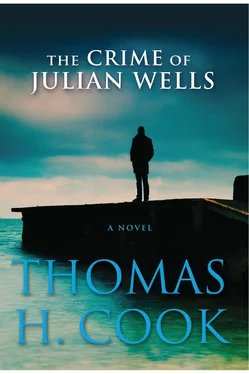Thomas Cook - The Crime of Julian Wells
Здесь есть возможность читать онлайн «Thomas Cook - The Crime of Julian Wells» весь текст электронной книги совершенно бесплатно (целиком полную версию без сокращений). В некоторых случаях можно слушать аудио, скачать через торрент в формате fb2 и присутствует краткое содержание. Год выпуска: 2012, ISBN: 2012, Издательство: Grove Press, Жанр: Криминальный детектив, на английском языке. Описание произведения, (предисловие) а так же отзывы посетителей доступны на портале библиотеки ЛибКат.
- Название:The Crime of Julian Wells
- Автор:
- Издательство:Grove Press
- Жанр:
- Год:2012
- ISBN:9780802194589
- Рейтинг книги:5 / 5. Голосов: 1
-
Избранное:Добавить в избранное
- Отзывы:
-
Ваша оценка:
- 100
- 1
- 2
- 3
- 4
- 5
The Crime of Julian Wells: краткое содержание, описание и аннотация
Предлагаем к чтению аннотацию, описание, краткое содержание или предисловие (зависит от того, что написал сам автор книги «The Crime of Julian Wells»). Если вы не нашли необходимую информацию о книге — напишите в комментариях, мы постараемся отыскать её.
The Crime of Julian Wells — читать онлайн бесплатно полную книгу (весь текст) целиком
Ниже представлен текст книги, разбитый по страницам. Система сохранения места последней прочитанной страницы, позволяет с удобством читать онлайн бесплатно книгу «The Crime of Julian Wells», без необходимости каждый раз заново искать на чём Вы остановились. Поставьте закладку, и сможете в любой момент перейти на страницу, на которой закончили чтение.
Интервал:
Закладка:
We were sitting in Harry’s office on Sixth Avenue. It was spacious with a large window overlooking the street. From such a vantage point, I thought, you could actually think of yourself as a prince of the city, something Harry clearly did.
“That has always been my view of Julian,” Harry continued. “That he was a very fine craftsman who worked with disgusting materials.”
“Did you ever tell him that?” I asked.
“Of course not,” Harry answered. “It wouldn’t have mattered anyway. After that book about Cuenca, Julian never considered writing anything but that grim stuff.” He shook his head as if in the face of such repellent work. “Like that African piece.”
“The one he wrote about Swaziland,” I said. “Yes, that was quite horrifying.”
“No, not that one,” Harry said. “The one about that French bastard.” He shivered. “Julian really made you feel the misery in that one.”
He meant Julian’s account of Paul Voulet’s vicious trek into the African interior.
“But at least that piece had a hero,” Harry added.
This was true, and Julian had written quite beautifully of Lieutenant Colonel Klobb, the man who’d gone after Voulet, trailed him from one outrage to the next, an archipelago of razed villages, slaughtered men, women, and children, some still alive when Voulet hung them from trees low enough for the hyenas to eat their feet. Klobb emerged at last as a paragon of courage and nobility, and his death at the hands of Voulet’s men generated a final scene of inevitable tragedy, life having once again turned its back upon the good.
Harry leaned back in his chair and folded his hands over a stomach much rounded by Grey Goose martinis. “I was quite shocked by Julian’s death, of course,” he said. “I suppose you were, too.”
I nodded.
Harry drew in a somewhat labored breath and leaned back in his chair. “And so we have seen the last of Julian.”
I found myself wary of closing the book on Julian so decisively, suspecting, as Loretta had, that the map of Argentina suggested a project Julian had been considering, but which he had, in the strongest possible terms, decided to abandon.
“Do you have any idea what his next book was going to be about?” I asked.
“No,” Harry answered. “He hadn’t mentioned any new ideas to me. Why do you ask?”
“He was looking at a map of Argentina,” I said. “Loretta told me that this was the way he always began to research his next book.”
Harry cocked his head to the right. “Why would the subject of Julian’s next book matter now?’
“I don’t know that it matters,” I admitted. “But he seemed very agitated during those last days, and I can’t help wondering what might have been on his mind. I suppose I’ve come to think of the map as a clue.”
“A clue?” Harry asked. “You’re a critic, Philip, not a detective. Julian’s next book went with him.” He clearly saw that I would not be so easily deterred. “All right, look,” he said, “I have no idea why Julian was looking at a map of Argentina, but he might have been thinking about a book on Pedro Lopez, the ‘Monster of the Andes.’ Three hundred little girls, can you imagine?”
“When did this happen?” I asked.
“It may still be happening,” Harry answered. “Because this Lopez fiend is still at large. So, maybe-perhaps like you, Philip- Julian had begun to fancy himself a detective, rather than a writer.” He released the breath of someone chronically frustrated by an author whose unprofitable direction had never changed. “Now, let’s forget about what Julian’s next book might have been and focus on what will surely be his last one. He worked his ass off on it, after all, and it’s going to be published posthumously, so we need to give it a little push.” He looked at me pointedly. “And try not to make the book sound too grim. People don’t like reading dark stuff.”
“That’s too bad,” I said. “Because they’re missing something.”
“Really? What?”
“The gravity of life.”
Harry sat back and folded his arms over his chest. “What’s bothering you, Philip? Clearly something is.”
With Harry’s question, the actual nature of what was bothering me came clear for the first time.
“It bothers me that there might have been something Julian never told me,” I said, “and that if he had, I might have saved his life.”
But this was a notion I couldn’t prove, and I had a job to do, so when I got back to my apartment, I considered what I could say at Julian’s memorial service that might help him matter, at least in the eyes of those in attendance. It would need to be something unique to Julian, or at least some gift he’d used uniquely.
But what?
I didn’t know, and so I let my mind drift toward other aspects of my remarks.
I’d need to mention the Russian book, of course. Harry had been right about that. I knew that people liked anecdotes at memorial services, and this realization allowed my mind to range without limit or direction over the years of my friendship with Julian. But soon I realized that to have such liberty was not altogether helpful in terms of organizing a eulogy, so I began to divide his life into the usual chronological segments: boyhood, early manhood, and the like. This was not helpful either, and in the end I found myself dividing Julian’s life into the parts represented by his books. To prepare my talk, I decided to peruse them in hopes of finding something cogent to say about each one. This would allow me to end my talk by giving a plug to the Russian book, Julian’s last and as yet unpublished work.
Later that evening, after I’d let time calm my mood a little more, I sat down in my favorite chair and again drew down the first of Julian’s books.
The Tortures of Cuenca .
The facts of the crime had been well known long before Julian had written his book, but I’d forgotten most of them, so I took a few minutes to familiarize myself with them again:
On August 21, 1911, a man by the name of Jose Maria Lopez Grimaldos, twenty-eight, was seen walking alone on the road between Osa de la Vega, a small town, and the nearby village of Tresjuncos in the Spanish province of Cuenca. Grimaldos was known as “El Cepa,” which means “the strain,” an odd nickname, all but untranslatable, as Julian had noted, but it evidently referred to the fact that Grimaldos was short and something of a dullard, thus, presumably, a “strain” on those who knew him.
On that day in August, Grimaldos had been seen on the road that led from the farm of Francisco Ruiz, where he sometimes worked, to his small house. He never got home, however, and the following day, his sister reported his disappearance to the authorities. Her brother had sold a few sheep on the day of his disappearance, she told them, and at least two men would have been aware that he was in possession of the proceeds from that sale. Their names were Valero and Sanchez, and it just so happened that they had often treated Grimaldos quite badly, ridiculing and bullying him. Was it not possible that they had robbed and killed him, too?
An investigation ensued, with other witnesses also focusing the investigators’ attention on Valero and Sanchez, but in the absence of Grimaldos’s body or any actual proof of his murder, the case had been closed in September of 1911.
There is no more haunting story than that of an unsolved crime.
Thus Julian had declared in the first line of his first book, and thus it had proved for the Grimaldos family.
Julian’s account of their relentless struggle for justice was the best part of the book, and as I read it again, I realized that it was there that Julian had found the beating heart of his narrative. It had not been in the aerial view of Spain with which he’d begun, suggestive though it was of his later sweep. Nor had it been in his meticulous rendering of the Spanish legal system, for that had been overelaborated and had at last grown rather tedious. It had not even been in Julian’s rendering of the fierce emotions that had seethed beneath Cuenca’s monochromatic landscape.
Читать дальшеИнтервал:
Закладка:
Похожие книги на «The Crime of Julian Wells»
Представляем Вашему вниманию похожие книги на «The Crime of Julian Wells» списком для выбора. Мы отобрали схожую по названию и смыслу литературу в надежде предоставить читателям больше вариантов отыскать новые, интересные, ещё непрочитанные произведения.
Обсуждение, отзывы о книге «The Crime of Julian Wells» и просто собственные мнения читателей. Оставьте ваши комментарии, напишите, что Вы думаете о произведении, его смысле или главных героях. Укажите что конкретно понравилось, а что нет, и почему Вы так считаете.












